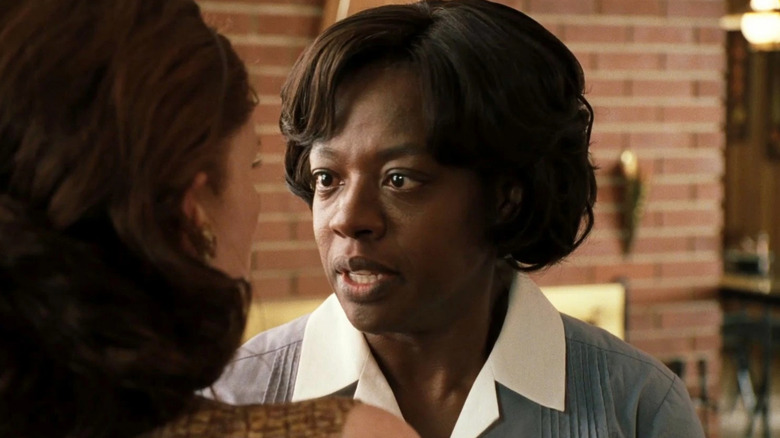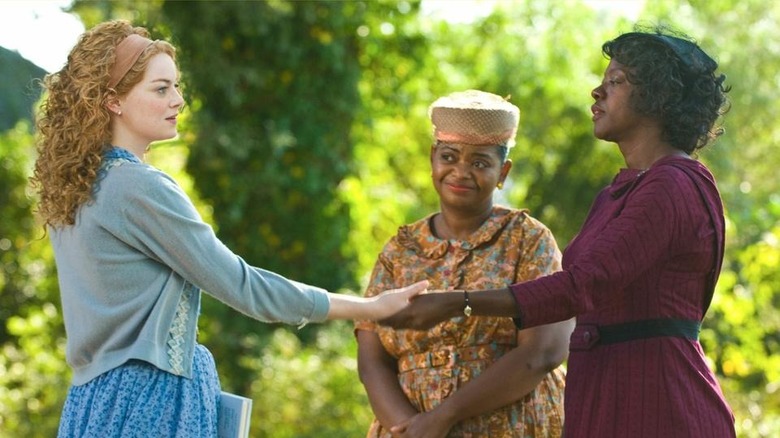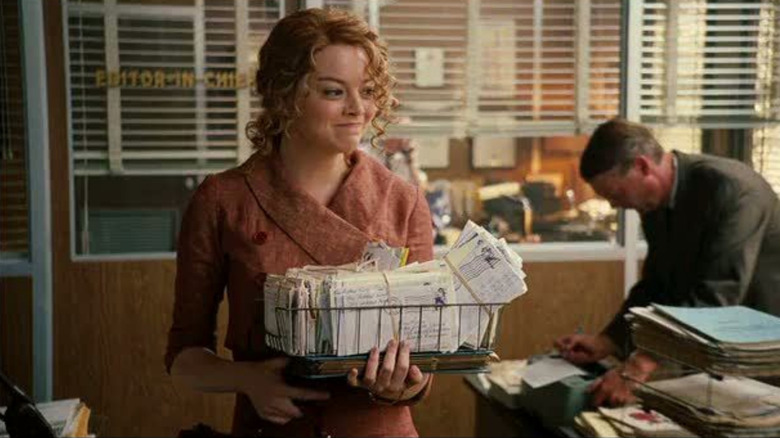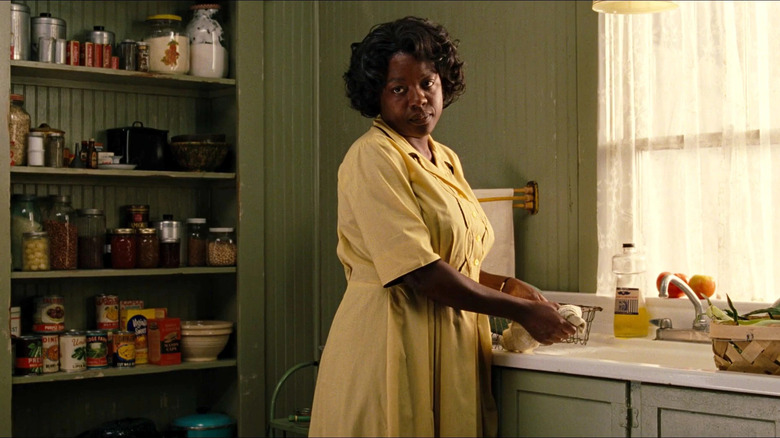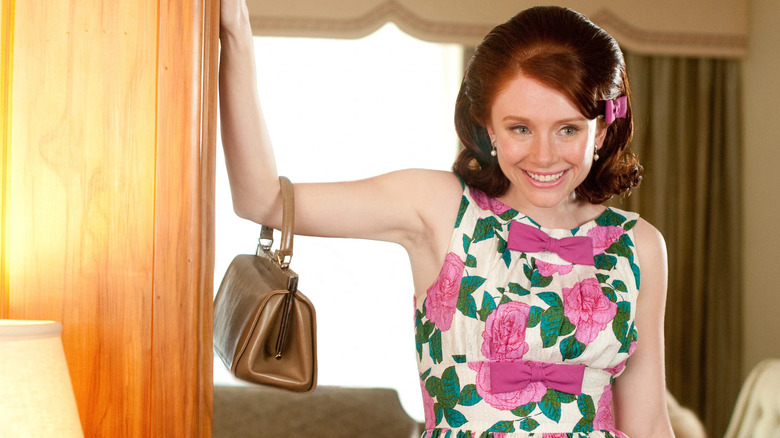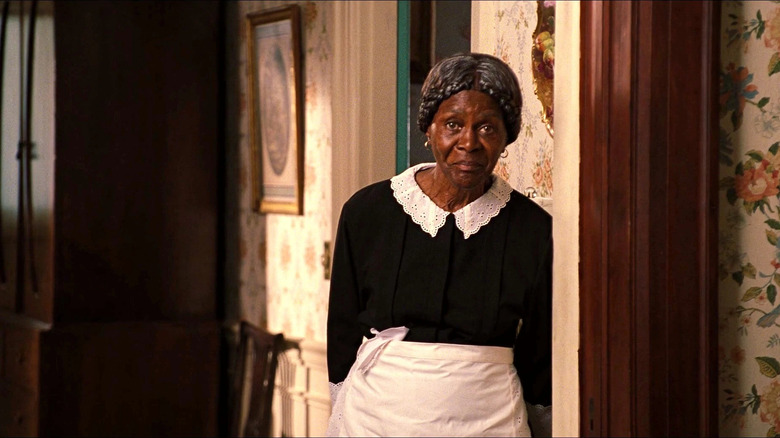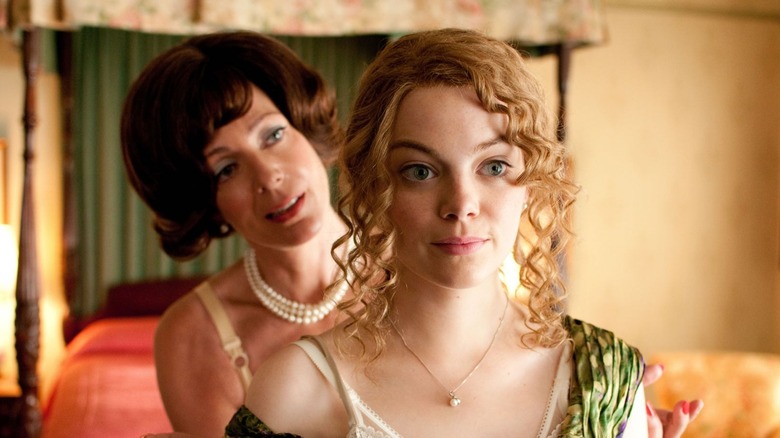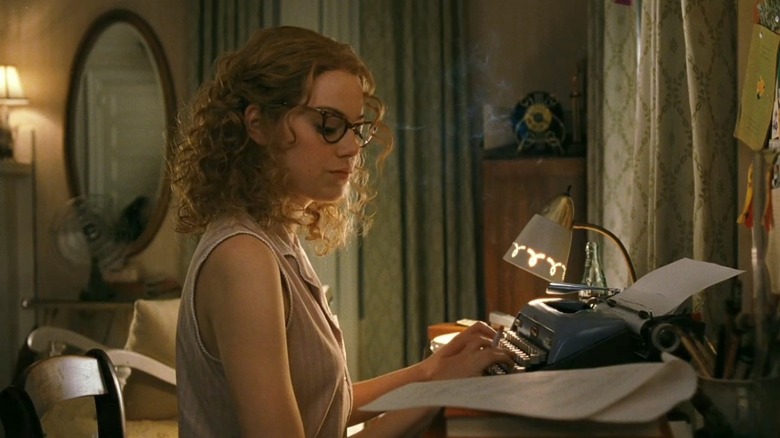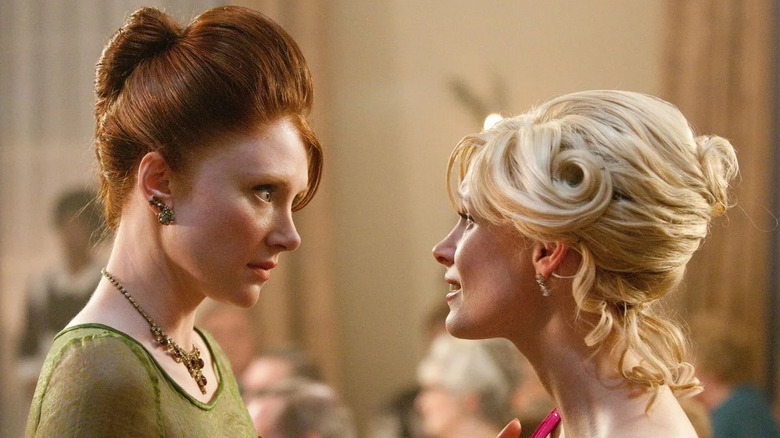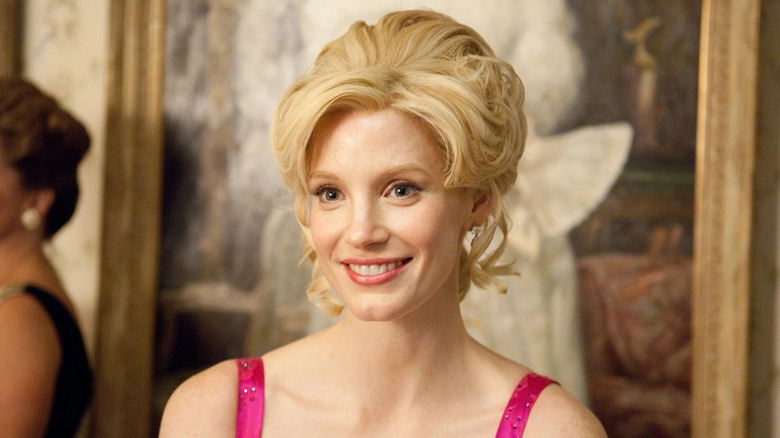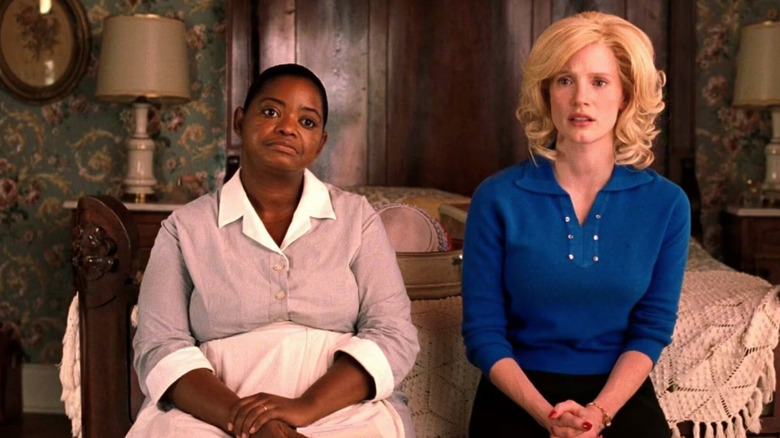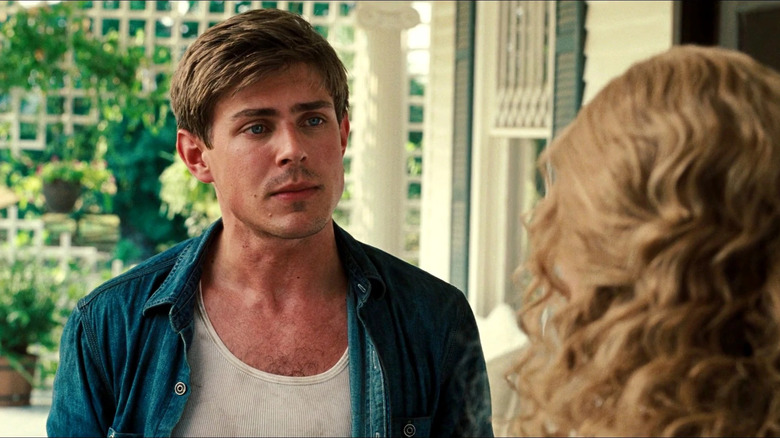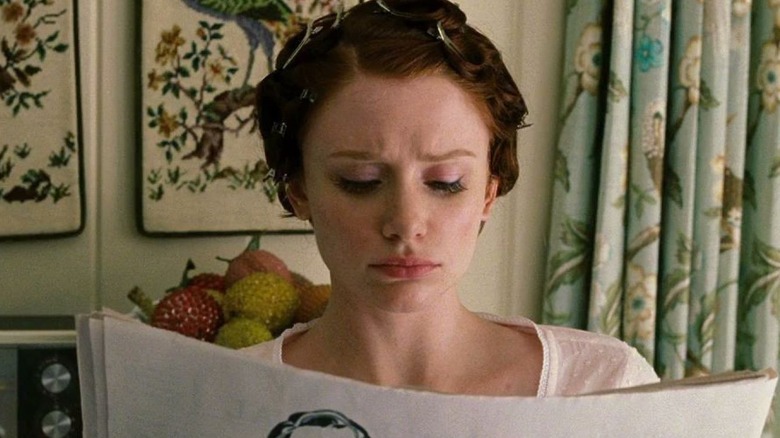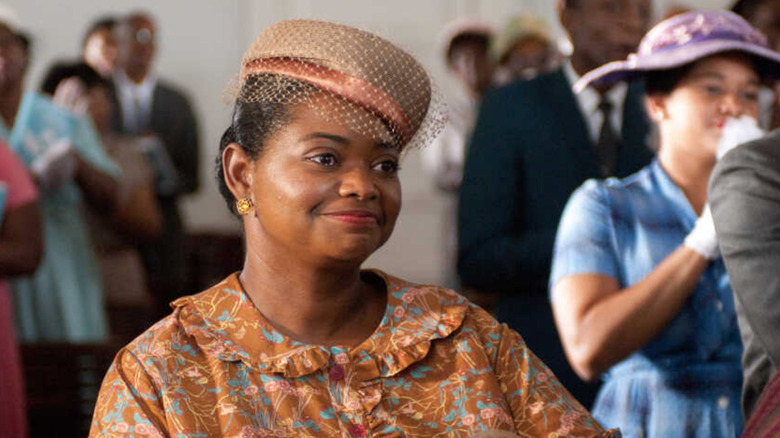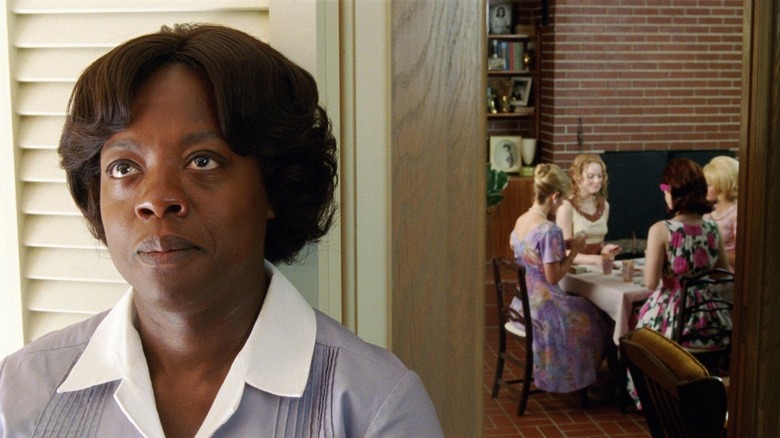How The Help Differs From The Book
Kathryn Stockett's 2009 novel "The Help" was a major best seller. The story follows a young woman named Skeeter in 1960s Jackson, Mississippi who returns home from college at Ole Miss with a new perspective on the world. She collaborates with Black maids Aibileen and Minny to help them and others tell their stories of working for white families, raising white babies, and living in the segregated South during the budding Civil Rights movement.
Naturally, because the book was such a hit, Hollywood came calling, and "The Help" was turned into a movie. Directed by Tate Taylor, the 2011 drama stars Emma Stone as Eugenia "Skeeter" Phelan, whose dream of being a writer leads her to focus on what most concerns her. Her eye gravitates towards how the help, the Black maids and other Black service workers of the era, are treated. Viola Davis co-stars as Aibileen with Octavia Spencer taking on the role of Minny, for which she won the Academy Award for Best Supporting Actress in 2012.
The rest of the cast includes Bryce Dallas Howard as the racist society leader Hilly Holbrook, Allison Janney as Skeeter's mother, Mrs. Charlotte Phelan, Jessica Chastain as social outcast Celia Foote, Cicely Tyson as Skeeter's aging maid Constantine, Chris Lowell as Skeeter's potential love interest Stuart, and Mary Steenburgen as Skeeter's editor in New York.
Much like any book-to-film adaptation, there were plenty of changes made. Here are some of the more prominent differences between the book and film versions of 'The Help."
The main character
Kathryn Stockett's novel is divided into three first-person perspectives: recent college graduate and aspiring writer Eugenia "Skeeter" Phelan, and maids Aibileen Clark and Minny Jackson. Each section allows the reader to dive further into the inner thoughts of the three main characters and gives a lot of insight as to what they're thinking or feeling throughout the story.
In contrast, the movie version of "The Help," Skeeter is very much the lead character. Yes, the viewer is invited into the lives and homes of Aibileen and Minny on occasion, but the film's story is very much about Skeeter's journey. Her growth and understanding of the world form the central narrative of the film. There's definitely a bit lost with the omission of a lot of Aibileen and Minny's perspectives, but like any book that's turned into a movie, some parts are abandoned to the cutting room floor. In this case, the filmmakers chose to make Skeeter the lead female character.
How Skeeter gets the Miss Myrna job
In the novel, Skeeter arrives home from college wanting to be a serious writer, but in order to start out, she applies for a job writing for the Jackson Journal. In the book, Skeeter gets offered the job of writing the cleaning and housekeeping advice column "Miss Myrna." She tries not to act so shocked by the offer, but when the editor says he can only pay her $8 a week, she's so pleasantly amazed at the amount that she gasps in disbelief. Thinking that Skeeter is offended by the rate, the editor quickly agrees to $10 a week.
In the movie, Skeeter getting the Miss Myrna job is a pretty uneventful and quick scene. The editor, played here by Leslie Jordan, offers her the $8 a week and she takes it, no questions asked or gasps produced. In the film, Skeeter also does provide a reference from Elaine Stein from Harper and Row publishing in New York. The reference is actually a rejection letter for a job Skeeter had applied to, but Skeeter uses Mrs. Stein's words, "Great potential. Gain some experience and reapply," to her advantage to get the job.
Aibileen's deceased son
In the novel, when Skeeter first tells Aibileen that she wants to be a writer, Aibileen remembers that her son, Treelore, had also wanted to be a writer before he died at the young age of 24 in an accident at his job. Aibileen tells Skeeter that Treelore had read "Invisible Man" by Ralph Ellison and wanted to write his own novel about what it was like to be a Black man in America. It's her son's thwarted dreams and ambitions that partially inspire Aibileen to tell Skeeter her stories and turn them into a book together.
In the movie, Aibileen does mention Treelore to Skeeter, and she talks of him in the voice-over narration. She speaks of how after his death she felt like she just didn't want to live anymore herself, but her best friend Minny pulled her up and out of the despair. She says that Treelore would like that she was sharing her stories with Skeeter, and said that he always thought there'd be a writer in the family one day. Aibileen mentions that she always thought it would be him, but there's no mention of Treelore having read "Invisible Man" or wanting to be a writer himself. It's not a huge change, but one that alters Aibileen's ambition slightly.
The villain Hilly Holbrook
The first time we see Hilly Holbrook in the film, she's marking up toilet paper to make sure that Minny isn't using the indoor bathroom. Her whole crusade to get a separate bathroom for the help in every white household truly exposes the obvious racism ingrained in her heart. But in the book, Hilly is more ignorant and old fashioned than outwardly evil. She truly believes in what she's trying to do, while also believing she has the best intentions.
In a little bit of pushing a character more extreme, the Hilly of the film, played wonderfully by Bryce Dallas Howard, is exceptionally more aggressive and sinister than the Hilly of the book. She barks orders at her friends' maids, she is unkind to them all, and also treats her mother terribly, putting her in a nursing home as punishment for laughing at the "terrible awful" pie incident (in which Minny bakes Hilly a pie with her own poop in it). Hilly's mother, played by a hilarious Sissy Spacek, gets more screen time in the film than page time in the book. She knows Hilly treats people awfully and comments on it throughout the film, whereas in the novel Hilly's mother is more of a silent side character who doesn't come up much. Hilly is for sure the villain of Stockett's novel, but in a way the whole of society is. In the film, she's definitely more of a "big bad," using her ignorance, racism, and hate to try and keep her white-lady minions in check.
The firing of Constantine
The story of what happens with Skeeter's beloved maid Constantine and how she left the Phelan family is very much changed from book to film. In the novel, Constantine has a light-skinned daughter named Lulabelle whom she gives up for adoption at four years old because of all of the gossip around Lulabelle being white. Years later, while Skeeter is away at college, Lulabelle shows up at the Phelan's DAR meeting and asks to join. When Mrs. Phelan asks her to leave, Lulabelle spits in her face. Mrs. Phelan tells Constantine she must either never see Lulabelle again or leave their employment. Constantine chooses her daughter and moves with her to Chicago. When Mrs. Phelan sends Constantine a check for her birthday, Lulabelle returns it, informing the Phelans that Constantine died three weeks after leaving Jackson.
In the movie, Constantine's daughter is Black and named Rachel. Rachel does also show up to a DAR meeting, but tries to use a prominent door and interrupt their luncheon. To save face in front of the DAR committee, Mrs. Phelan fires Constantine in a rage. After regretting her decision, Mrs. Phelan sends her son Carlton to pick Constantine up in Chicago, but he finds that she has already died. In the film, Skeeter's mother finally tells her the truth, but in the book she learns the real story from Aibileen, Skeeter's mother keeps her vague, shameful secrets to herself.
Mrs. Phelan's health
Skeeter's relationship with her mother in both "The Help" book and the film is a contentious one. The fact that so much of the story revolves around the maids raising the white children means that for most of these young white women, they have closer relationships with their maids than with their own mothers — until they become the boss that is. So of course Skeeter's relationship with her own mother is a bit formal and distant. But in both the book and movie, Mrs. Phelan's health causes them to come together a bit more.
Mrs. Phelan starts out the book fine and healthy, if a bit exhausted. It's later on that she goes to the doctor and discovers that she has cancer. The diagnosis comes later on in the book, which is a moment of shock for Skeeter that the film version lacks. In the film, Mrs. Phelan is ill from the start. We see her trying on wigs after having lost her hair, and she even mentions her "cancerous ulcers" at a lunch. At the end of the film, after having read Skeeter's book, she has a change of heart about her pursuits, apologizes for her role in Constantine leaving, and she and Skeeter reconcile. With her health on the mend, Skeeter feels that she can head off to New York and take the job she's offered with Harper and Row.
The Jim Crow documents
In the film, just before Skeeter begins interviewing the maids, she checks out a pamphlet that details all of the illegalities of white people and Black people working together, particularly as it pertains to working together against racism and segregation. Hilly finds the pamphlet in Skeeter's bag and warns her that there are "real racists in this town" and she should be on the lookout, implying that she herself isn't one of those "real racists."
In the book, this situation is slightly different. Skeeter accidentally leaves her bag at Hilly's house after a Junior League meeting. Inside it, Hilly finds not only the Jim Crow pamphlet, but some of the interviews Skeeter has already done with some of the maids, and Skeeter's own notes on Hilly's toilet initiative that asks how it's different from other segregation laws. Skeeter drives to Hilly's to retrieve the bag and Hilly warns her that Skeeter's boyfriend Stuart's father is close with the governor. It's a little more threatening that Hilly has access to the interviews before the book comes out, so removing that element from the film seems like an easy way to have Hilly be more surprised that the stories were being told.
Celia and Hilly
The relationship between Celia and Hilly is pretty much the same in both the book and the movie. In their history, Hilly and her then-boyfriend Johnny had just broken up before he started seeing Celia. When Celia and Johnny got married, Celia was already pregnant. So Hilly assumes that Celia and Johnny had been having an affair while she was still with him. When Celia learns this is why Hilly always treats her poorly, she decides to tell Hilly the truth at the holiday charity auction. In both versions, Celia has too much to drink, stumbles into Hilly, and rips her dress. How the situation resolves itself is a little different in each.
In the book, Hilly sends Celia a letter asking for $200 to repair the dress as a "donation" to her charity. She also asks that Celia refrain from participating in any of their Junior League charity events in the future. Celia sends the check without an issue. In the film, Celia gets a bit cheeky. There's no letter from Hilly asking for the money, but Celia sends her $200 anyway, with the check made out to "Two Slice Hilly," referencing the number of slices of "terrible awful" pie Hilly ate.
Celia's drinking problem
Though there is a scene in "The Help" both book and movie in which Celia has too much to drink, Celia having a drinking problem is something that comes up in the novel a little differently. At first, Minny thinks Celia may have a problem with alcohol. Celia keeps sneaking off upstairs, taking naps, and drinking some kind of strange tonic. As it turns out, Celia is trying to rest so that she doesn't cause another miscarriage, and the tonics she's drinking are some kind of pharmaceutical drink to aid her pregnancy.
None of Minny's worries about Celia's drinking made it into the film, however, nor did Celia's resting or her medical concoction. What does are Celia's repeated miscarriages and the fact that she keeps them from Johnny. But Johnny tells Minny near the end that as soon as Minny had started working there was when Celia started getting better, and Minny's help with Celia's recent miscarriage brought the two closer together.
Celia and Minny battle an intruder
Celia and Minny's relationship is one of the most touching parts of both the book and the movie versions of "The Help." Minny teaches Celia to cook, teaches her how to not worry about what the "popular" woman think of her, and gives her more confidence. In turn, Celia gives Minny a stable household and job where she isn't treated like a lesser human being.
One high-stakes situation with Celia and Minny does get left out of the film, though. There's an instance where a vagrant man tried to break into Celia's house. Minny tries to scare him off with a broom, but he manages to land a hit on Minny. Celia then whacks him with a fireplace poker and he runs off. Celia defending Minny and saving the two of them is another example of how the two women consider themselves on equal footing, and become closer friends.
Stuart and Skeeter: A couple never meant to be
Skeeter's relationship with boyfriend Stuart is handled a bit differently in the book and film versions of "The Help." In the book, she and Stuart are set up on a blind date but Stuart gets drunk and tells Skeeter that he's not ready to date anyone. Later, they do start dating, but break up and have kind of an on-again off-again relationship because he's still hung up on his old fiancée. Stuart finally proposes, but after Skeeter tells him about the book she's writing, he breaks up with her for good. There are other moments from the book that didn't make it into the film, such as a dinner with Stuart's family, and more details about his ex-fiancée becoming a hippie, but Stuart ends up being a pretty minor character in the movie.
In the film, Stuart and Skeeter meet the same way, but when Skeeter notices how drunk Stuart is at the table she storms off. Stuart arrives at her house a few weeks later saying he told Hilly he wasn't ready to date again after his engagement ended the year before. They have a nice date, however, and seem to be going steady for a while before Skeeter finally comes clean about the book and Stuart calls it off for good, just like in the novel.
Hilly's physical changes
Racist villainess Hilly Holbrook goes through a number of physical changes throughout the story, indicating that her cold heart and wretched deeds are probably having an effect on her outer appearance. In the book, Hilly gains weight over the course of the story, when at first she appeared the epitome of slender 1960s beauty.
In the movie, Hilly does start out with that perfectly cinched waist within colorful dresses, immaculate makeup, and hugely beehived hairdo. In contrast, Skeeter's wild curly hair, drab clothing, and gardening shoes are meant to signify that she's different from the popular ladies of her age group. When Hilly finally has to confront Skeeter, or tries to, about her role in Skeeter's book, her physical appearance has deteriorated, probably as a result of the stress. Her hair is a mess, her clothes are ragged, she's wearing pants, and a blistery cold sore has popped up on her lip. In both book and film, Hilly's less-than-perfect outward appearance signifies that her world is falling apart a bit, though each medium handles it in a different way.
Minny leaving Leroy
Minny Jackson is such a strong, outspoken, and commanding presence in "The Help," yet she suffers physical abuse at the hands of her husband, Leroy. In the novel, the reader gets more insight into Minny's fears, her belief that she loves, or once loved, her husband, and how she navigates his moods and violence. In the book, Leroy comes after Minny one last brutal time, attempting to kill her after their son loses his job because of Minny. It's the final straw, and Minny decides to leave him, her survival assured by the money Skeeter gives all the maids who participated in her book.
Leroy goes unseen in the film version of "The Help," but we do witness one scene of Leroy bursting home, and hear Minny's screams over the phone while she's talking to Aibileen. Thankfully, the scene is brief, but Minny's decision for leaving Leroy comes a bit differently in the movie. After keeping her presence a secret from Johnny for many weeks, Celia surprises Minny with a home-cooked lunch utilizing all the techniques that Minny taught her. She and Johnny assure Minny that she has a job for life, if she wants it, which gives Minny the courage to leave Leroy for good.
Aibileen's new job
At the end of the movie, Skeeter gets offered a job at Harper and Row in New York City, which she takes after a bit of hesitation over leaving her sick mother, and leaving Aibileen and Minny to deal with the aftermath of their book release. After Hilly claims that Aibileen stole two pieces of silver from her set, Aibileen gets fired from her maid job, and decides to retire from maid work. The film ends with Aibileen literally walking off into the sunset, saying she's going to be the writer in the family, but with no clear indication of how Aibileen is going to make a living.
In the book, Aibileen's future is a little more clear cut. After taking the new job, Skeeter admits to her editor at the Jackson Journal that it was Aibileen giving her the answers to the Miss Myrna letters the whole time. The editor offers Aibileen the job for the same $10 a week that he paid Skeeter, and Aibileen ends the book with a new career.
